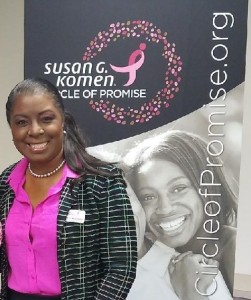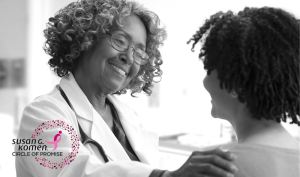February is Black History Month. Did you know that African American women have a survival rate that’s 41 percent lower than their counterparts? The same research indicates that African American women are often diagnosed at later stages, sometimes with more aggressive forms of cancer and at younger ages.
Susan G. Komen has pledged to ensure that this group of women are empowered with the information and tools they need to take charge of their own health and serve as ambassadors in their local communities.
We sat down with Komen OC’s LarLeslie S. McDaniel, Circle of Promise Community Resource Advocate, to discuss this alarming trend and Komen’s initiative to change this reality.
1) Can you explain why there is an immense disparity between African American women and their counterparts in diagnosis/survival of breast cancer?
There is no simple answer to this question as there are many contributing factors; some of which may include:
- An increasing trend towards breast cancer incidence and late stage diagnosis
- Fears around screening and diagnosis
- Loss to follow-up (not receiving timely medical follow-up and/or not completing treatment continuum of care)
- Lack of trust in the medical system
- Lack of knowledge of resources and medical recommendations
- Uninsured or underinsured without access to high quality medical treatment and/or screening services.
2) What are some general tips to reduce the risk?
Early detection is key to survival. If diagnosed early, the 5-year relative survival rate for breast cancer is 99%. Some risk factors can be controlled and others can’t. The two greatest risk factors for breast cancer are being female and getting older, which cannot be controlled. It is important to note that while “risk factors” are associated with an increase chance of getting breast cancer, they do not cause breast cancer. These are Komen’s recommendations:
- “Know your risk.” Learn about your family health history and talk to your health care provider about your own personal risk.
- “Get Screened.” Ask your doctor which screening tests are right for you if you are at a higher risk.
- Have a mammogram every year starting at age 40, if you are at average risk.
- Have a clinical breast exam at least every 3 years starting at age 20, and every year starting at age 40.
- “Know what is Normal for You.” Know how your breasts look and feel and report any changes to your health care provider right away.
- “Make Healthy Lifestyle Choices.” Maintain a healthy weight. Exercise regularly. Limit alcohol intake and menopausal hormone use and breastfeed, if you can.
3) What is the Circle of Promise?
The Circle of Promise is a California Initiative created by all Susan G. Komen affiliates in the state of California, including Orange County, to address breast cancer disparities at all levels, specifically targeting African American women age 40 and older. The goal of the initiative is to empower women with the knowledge and resources to enter and seamlessly move through a quality, culturally competent system of health care; to get information, get support and gain access to services that could save their lives.
4) What local resources are available for African-Americans in Orange County if they are uninsured or underinsured, and in need of mammography screening and other resources?
Komen OC can help. Our network partners with health care agencies, hospitals, various community partners and companies to provide all the possible resources to support women, and their families, through their breast cancer experience. You can find resources for mammography, support groups, financial assistance, and local events among others.
We encourage you to help us rewrite the story. The COP Partnership meets bi-monthly for members to learn more about community partnerships and increase breast cancer awareness in the African American community. The next meeting is on Tuesday, March 27, at 7 p.m. at the Komen OC Affiliate office on 2817 McGaw Ave. Irvine, CA 92614.
Help us rewrite the story of African Americans and breast cancer by joining the Circle of Promise. You can reach LarLeslie McDaniel at 714-957-9157 Ext. 29 or lmcdaniel@komenoc.org.
Filed under: black history month, breast health education, Breast Health News, Circle of Promise | Tagged: #KomenOC, advocates, breast cancer, breast cancer research, breast health, breast health education, Circle of Promise, komen, komen for the cure, komen oc, komen orange county, mammograms, orange county, susan g. komen, susan g. komen for the cure, susan g. komen for the cure orange county affiliate, Susan G. Komen Orange County, susan g. komen orange county affiliate | Leave a comment »







